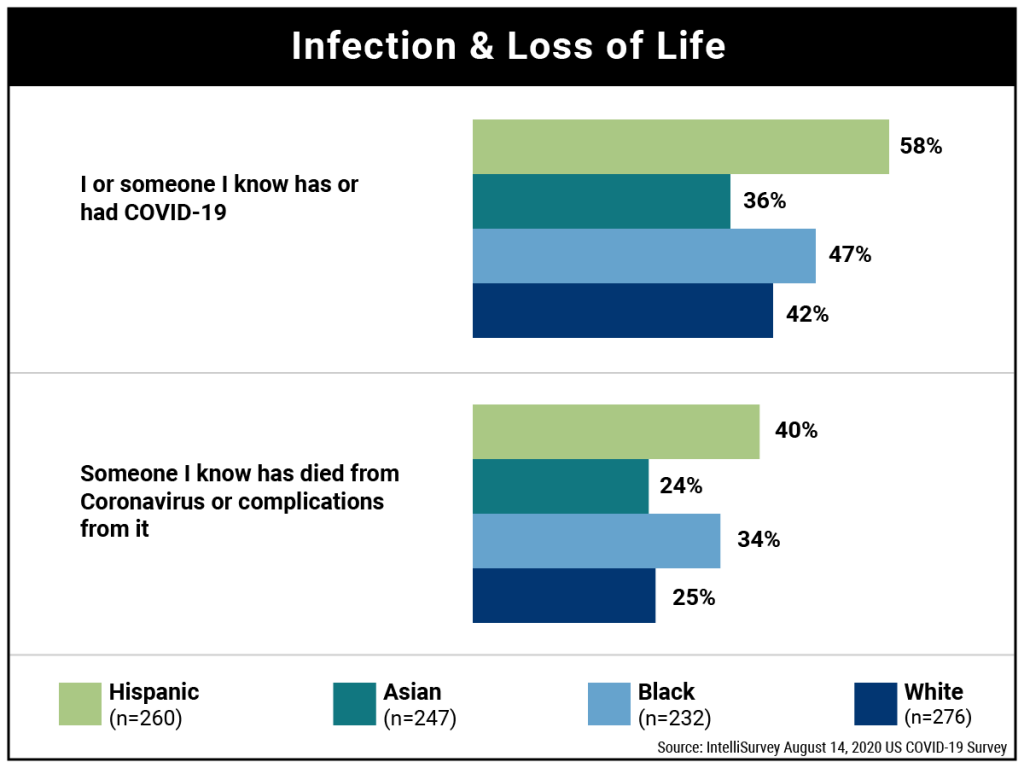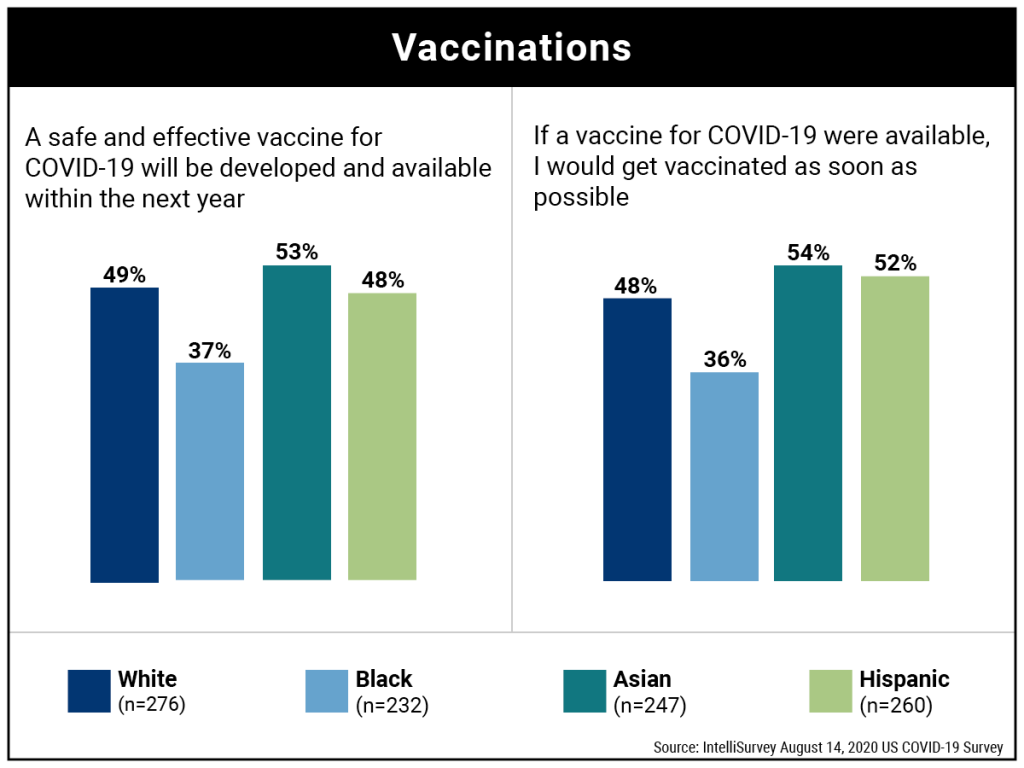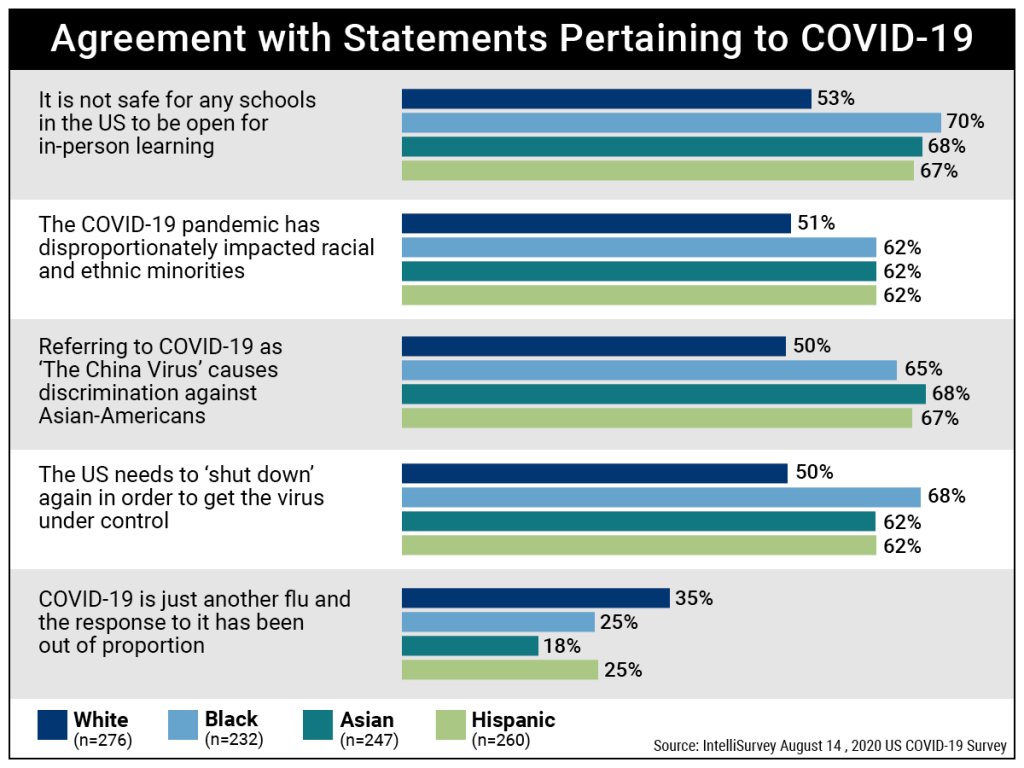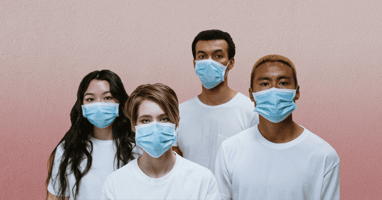A recent comprehensive review of data on nearly 1.5 million US coronavirus patients, conducted by...
Life in the Time of COVID-19: Personal Impact and Beliefs by Race/Ethnicity

Since the end of March, 2020, IntelliSurvey has conducted 13 surveys in its ‘Life in the Time of COVID-19’ series, with each online survey fielded among a nationally representative sample of ~1000 US respondents. One drawback with this sampling approach is that it can be difficult to compare the results by race and/or ethnicity since White people constitute more than three-quarters of the US adult population, and this is mirrored in the representative sampling.
IntelliSurvey’s most recent ‘Life in the Time of COVID-19’ survey, fielded in the US on August 14, 2020, utilized a different sampling approach, collecting responses from a total of 1018 adults in the US, with roughly equal numbers of responses from four self-identified groups: White Americans, Black Americans, Asian Americans, and Americans of Hispanic or Latino descent or origin. This approach allows for an examination of how each of these groups has experienced the pandemic in terms of personal impact and beliefs.
Infection and Loss of Life
As shown in the following chart, there are disparities by race and ethnicity in respondents’ experiences of COVID-19. In particular:
- While they make up only 18% of the US adult population, nearly 6 in 10 respondents of Hispanic or Latino origin indicate that they or someone they know has or has had COVID-19.
- Similarly, nearly half (47%) of Black respondents report that they or someone they know has or has had the COVID-19 virus. It should be noted that Blacks make up approximately 12% of the US adult population.
- In addition, 40% of Hispanics in the study and 34% of Blacks report that they know someone who has died of COVID-19 or complications from it.
- While lower percentages of Asian respondents report a personal connection with the COVID-19 virus (36% have or know someone who has had the virus, and 24% know someone who has died from it), it should be noted that Asian Americans make up only about 6% of the US adult population.
These findings are supported by a variety of reports issued by health agencies since early in the pandemic that suggest that persons in these groups are disproportionately affected by the COVID-19 pandemic; that is, compared to their shares of the total population, these groups account for higher shares of both cases and deaths from COVID-19. Both medical and socioeconomic factors may contribute to this imbalance. Underlying medical conditions, such as diabetes and heart disease, are more prevalent among Black and Hispanic Americans (along with Native Americans). In addition, people of color are more likely than Whites to live in crowded, multi-family dwellings in urban areas, and less likely to be able to work from home, all of which increase the likelihood of exposure to the virus.
Vaccinations
Some divergent beliefs and intentions about a COVID-19 vaccine emerged from the study, with Black respondents significantly less likely than White, Asian, or Hispanic respondents to:
- Believe that a safe and effective vaccine for COVID-19 will be developed and available within the next year (37% of Black respondents believe this vs. 48-53% of the other groups).
- Intend to get vaccinated as soon as possible if a vaccine for COVID-19 was available (36% of Black respondents intend to get vaccinated vs. 48%-52% of the other three groups).
These results may reflect a lack of trust among Black Americans with regard to the medical community, which is not surprising, given past experiments in the US such as the Tuskegee syphilis study.
Common Ground
Although the preceding results revealed differences among the three minority groups in this study, there were some commonalities among them, particularly regarding attitudes related to COVID-19 when compared with White respondents.
All participants were shown a randomized list of statements regarding COVID-19 and asked to indicate whether they agreed or disagreed with each. As shown below, the three minority groups, i.e., Black, Asian, and Hispanic respondents, are significantly more likely to agree that:
- It is not safe for any schools in the US to be open for in-person learning.
- The COVID-19 pandemic has disproportionately impacted racial and ethnic minorities.
- Referring to COVID-19 as ‘The China Virus’ causes discrimination against Asian Americans.
- The US needs to ‘shut down’ again in order to get the virus under control.
And significantly less likely to agree that:
- COVID-19 is just another flu, and the response to it has been out of proportion.
It is to be expected that those who have been personally impacted by COVID-19 take it more seriously than those who have not. In this survey, compared to White respondents, larger numbers of minority respondents have had or know someone who has had (or died) from COVID-19. It is, therefore, not surprising that the majority of these three minority groups of respondents support stricter measures to stop the spread of the virus, e.g., not open schools for in-person learning, or even ‘shut down’ the country again. Conversely, White respondents in the study are less likely to have been personally impacted by COVID-19, which may explain the significantly higher percentage of this group that feels that COVID-19 is ‘just another flu.’
Over 170,000 people in the US have died to date from COVID-19 or complications from the virus, with a disproportionate number of deaths occurring among people of color. For more details, see this CDC infographic regarding COVID-19 cases, hospitalization, and death by race/ethnicity, as well as IntelliSurvey’s Differences in Pandemic Experience and Perceptions by Race and Ethnicity.
Respondents for this survey were collected via Lucid Marketplace.





